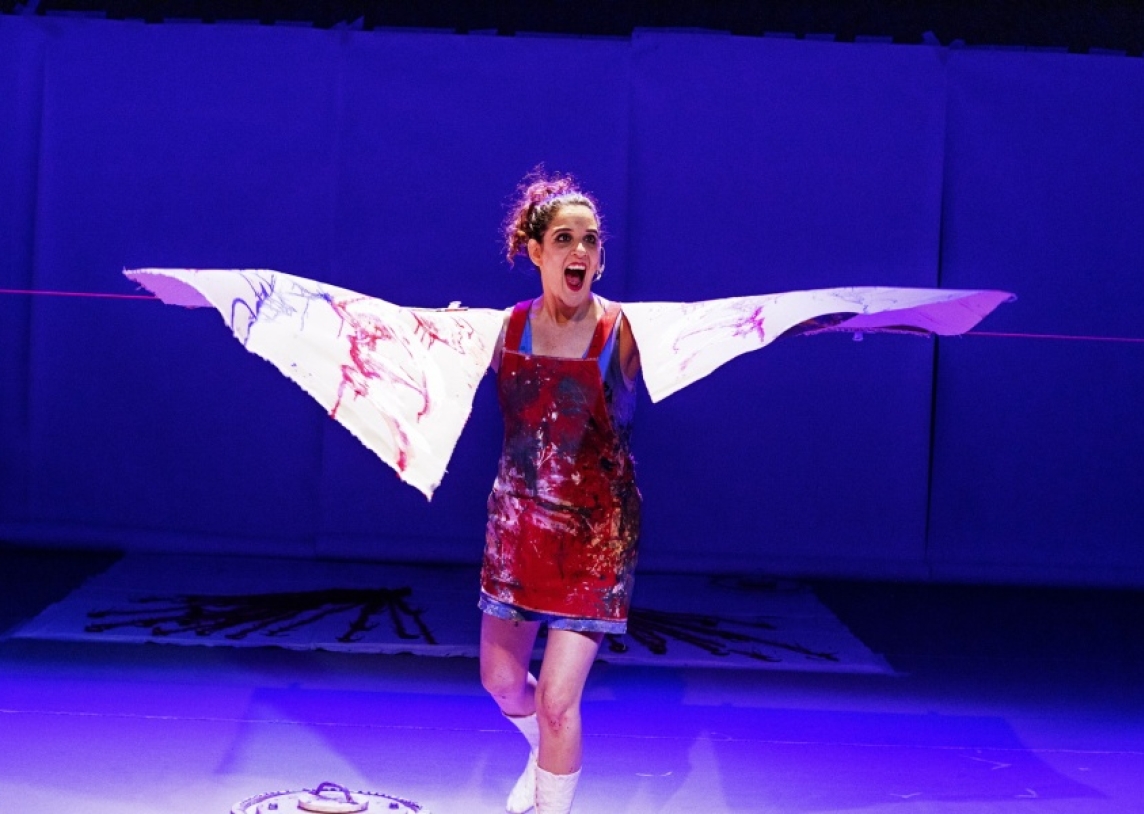- International Platform
- Content
Content
Michal Svironi: Carte Blanche
Author: Tjaša Pirnar
The critique was originally published in the newspaper Delo (27.9.2022), with which the platform collaborated during the Lutke Festival 2022.
The concept of a human as a blank slate has been with us since antiquity, and Israeli artist Michal Svironi (authorship, design and performance) adds her own mark on the long history of the concept by painting an intimate confessional performance (co-written by Johnny Tal) on carte blanche.
The whiteness of Carte Blanche is never truly empty. If the actress does not smear it with colours with decisive strokes, she reads from it or even reveals that the whiteness is hiding a doll or a branching family tree of red figurines. In true Althusserian fashion, something is always already. The author's desire for a simpler life is traced back to childhood, the foetus, the atom, but nothing isolates her; she is embedded in her environment and history. Her initial alienation from the world, from which she cannot separate herself, grows into a story about living with oneself and about what binds more or less different people together in one family. In one—also metaphorically colourful—hour, escapist longing is transformed into cathartic acceptance, nostalgia, forgiveness and farewell (dramaturgy by Miki Mevorach).
Although Carte Blanche is a personal confession, we recognise ourselves in some of the author's experiences – political disagreements within the family, career challenges, romantic failures, reminders of the ticking of the biological clock... For instance, it delves subtly into the pain of loss of loved ones and the lack of a true farewell, as well as the fear of one's own transience and oblivion, but in spite of the serious themes, it maintains dynamism with a great sense of humour and gives the performance a lighter tone. As a performer, she speaks to the audience with a powerfully authentic and vulnerable presence, so that we are tensely following her visually marked narrative, wherever on the emotional spectrum she takes us in a given scene; she easily commands the entire space and fills the whiteness of the canvases on stage.
Life is never completely white, unwritten. Fittingly, Michal Svironi has found her creative expression in a genre she calls paint-theatre, where we not only metaphorically but also literally live in the dissonance of raw reality, in the colours on the canvases and on the body; the stage is a confused and unpredictable space of possibilities and imprints.
In this painting and theatre venture, the artist enters into a dialogue with her ongoing artistic work. It is a unique exploration of the extent of theatrical expressiveness of painting, which in Carte Blanche ranges from the representation of one's own body in time, through the creation of a talking picture, to the emancipation of paint, which, spilling over the canvas, weeps. It interweaves various painting and animation techniques to keep the show varied, unpredictable and rhythmic. Colour becomes a co-actor, but it is also a trace that remains behind the performance as a flirtatiously hopeful answer to the question of what is left behind and what is remembered.
Contrary to the frequent and rather general tendency of making the puppet independent from the animator, Michal Svironi's animation also functions as an extension of the storyteller herself. Although the animated images appear as people from her own life, it is she who, with the paint on her hand or a brush, materialises the people, brings them to life and pronounces their words. In this context, animation functions as a resurrection of memories, a resurrection of the dead and the living, all from the performer herself. All the canvases, the stains, the images, the threads, all the order and chaos of the stage – all this is an exhibition of the intimacy of a single person, written with experience, filled with memories. A self-contained, full, colourful carte that never was and never can be blanche.
This publication is written in the context of the project "European Contemporary Puppetry Critical Platform"

